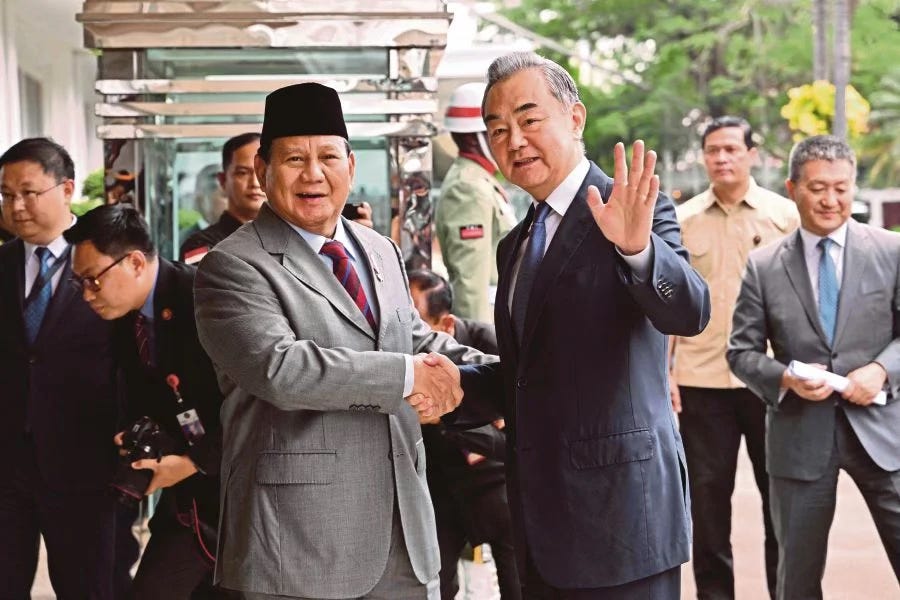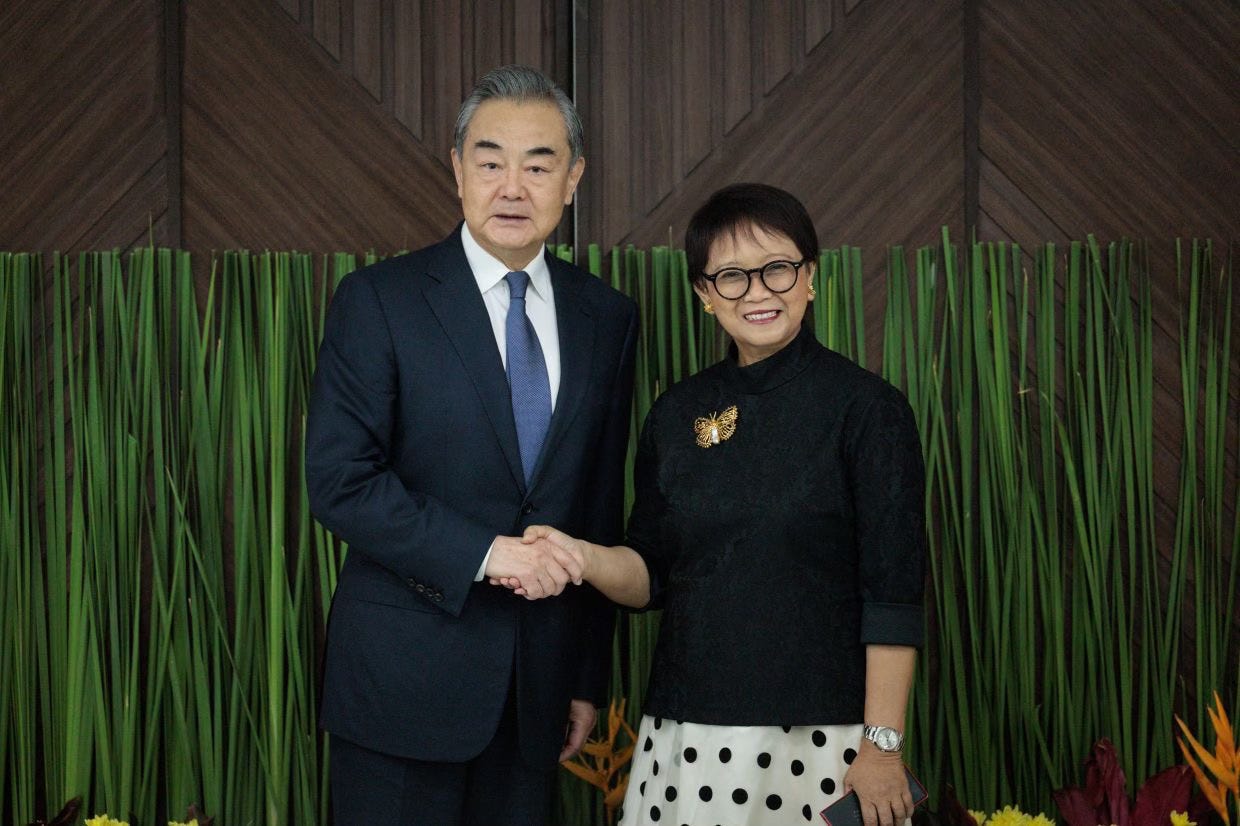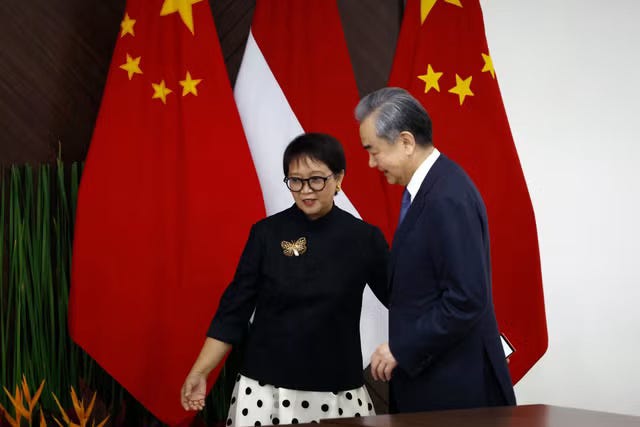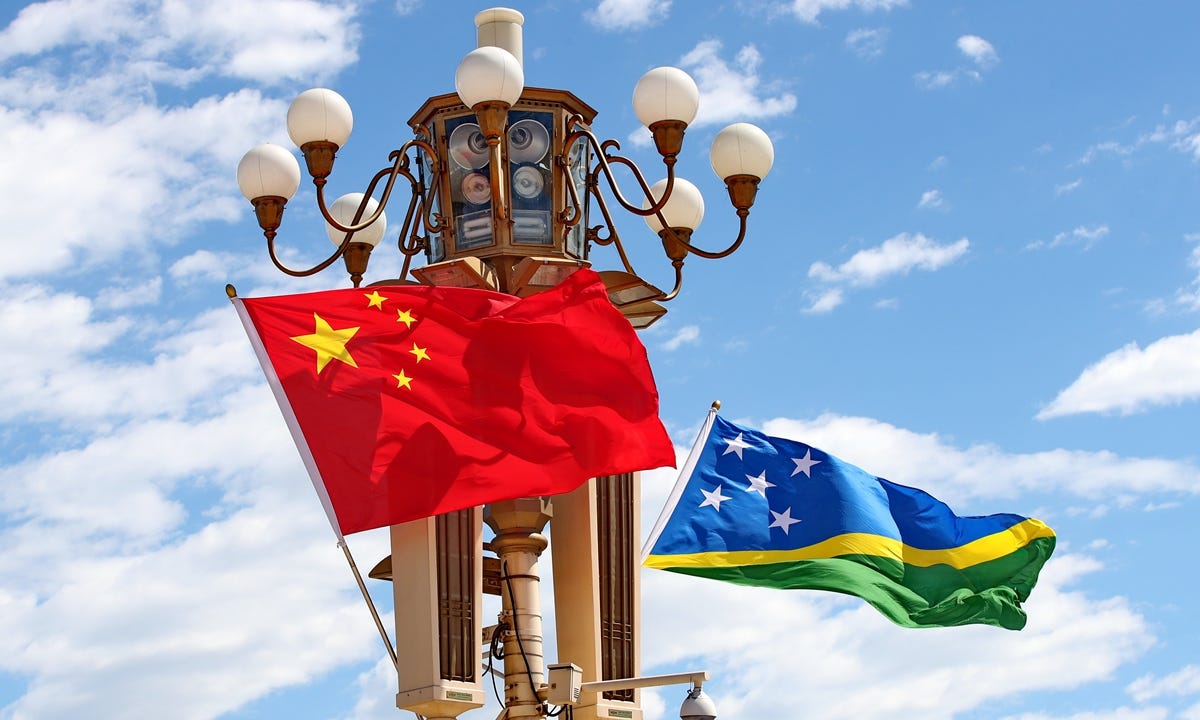No "blank cheques"
Beijing is courting Jakarta with promises of investments. Wang Yi in Papua New Guinea accelerates bilateral cooperation, Solomon Island’s election “people’s will”.
Indonesia & China Go Back to the Future
Beijing is courting Jakarta with promises of investments. Meanwhile, the US is losing sway the longer it dithers over Gaza.
By Karishma Vaswani
When Indonesia’s President-elect Prabowo Subianto chose to visit China months before his inauguration, it caused eyebrows to raise across the region. Jakarta has long sought to balance its relationship with Beijing and its close ties with the US, so to send such a strong message caught many off guard.
Yet the blossoming relationship is a sign that these Asian economic giants are finding fresh ways to engage. China and Indonesia’s friendship is being cemented along the lines of increased opportunities for investment, but it’s not just that. Indonesians are increasingly concerned about the Biden administration’s failure to restrain Israel’s actions in Gaza. If the US wants to win hearts and minds while China plays the long game in Indonesia, then finding a way to allay those concerns is critical.
Beijing has been keen to highlight Washington’s gaps. China’s Foreign Minister Wang Yi made a whirlwind tour of the world’s most populous Muslim nation last week, keen to build ties with Prabowo. The trips have coincided with a noticeable rise in positive sentiment toward China among Indonesians, detailed in a recent survey from the ISEAS-Yusof Ishak Institute.
As Leo Suryadinata and Siwage Dharma Negara note, the ongoing war in Gaza has clearly turned Indonesians against US foreign policy actions. When asked if the Association of Southeast Asian Nations “were forced to align itself with one of the strategic rivals, which should it choose?”, 73% of Indonesian respondents selected China while only 27% preferred the US. This is a significant shift from 2023, when 54% of Indonesian respondents nominated China and 46% sided with the US.
Beijing is sensing the winds of change. During his meetings with outgoing leader Joko Widodo Thursday, Wang denounced the US for blocking United Nations resolutions calling for a ceasefire in Gaza. Not a new line for the Chinese, but their vocal support has not gone unnoticed in Southeast Asia, home to two sizeable Muslim majority nations: Indonesia and Malaysia. These countries want to see see more global leadership on an issue that has stoked outrage across their communities.
Managing Indonesia’s interests against the backdrop of the US-China rivalry will be a key task for Prabowo when he takes on his new job this October. He has had a mercurial approach to navigating Beijing, and has flip-flopped on whether he sees the nation as friend or foe. This is a clever strategy and in line with Indonesia’s bebas-aktif, or free and active foreign policy, that’s likely to continue under the new president.
China is an important source of foreign investment for Indonesia — coming in only second to Singapore — and it is also the largest trading partner. Outgoing leader Widodo has also been keen for Beijing to help build his legacy project, Nusantara, the new capital city that is still under construction in the province of East Kalimantan.
But as Rizal Sukma, senior fellow with CSIS in Jakarta points out, although Jakarta has become more comfortable in dealing with Beijing over the years, citizens express very real concerns about the growing economic relationship, particularly over China’s migrant workers and how reliant Indonesia is becoming on the world’s second-largest economy, especially in the mining sector. Infrastructure and industrial projects tend to be the areas where the Chinese like to invest the most. One of the most high-profile has been the Jakarta-Bandung high-speed rail project, worth some $7 billion. But there is scrutiny, too, with sporadic protests highlighting the antagonism toward projects funded by Chinese companies that threaten to displace indigenous communities.
So even as the two become closer, the US is still hugely strategic, as a recent survey by Indonesia’s National Research and Innovation Agency shows. Jakarta depends on military equipment that is mainly purchased from America, and holds annual joint military exercises under the Garuda Shield program. It needs Washington’s active presence and support to push back against China’s claims that overlap with Indonesia’s in the South China Sea — another challenge for Prabowo at a time when Beijing is determined to make its presence felt throughout the contested waterway.
The US is only losing in the court of public opinion because of its lack of action to help end the suffering for Palestinians. Making its position clear could go a long way toward changing that.
Read more here.
NB: Karishma Vaswani is a Bloomberg Opinion columnist covering Asia politics with a special focus on China. Previously, she was the BBC's lead Asia presenter and worked for the BBC across Asia and South Asia for two decades.
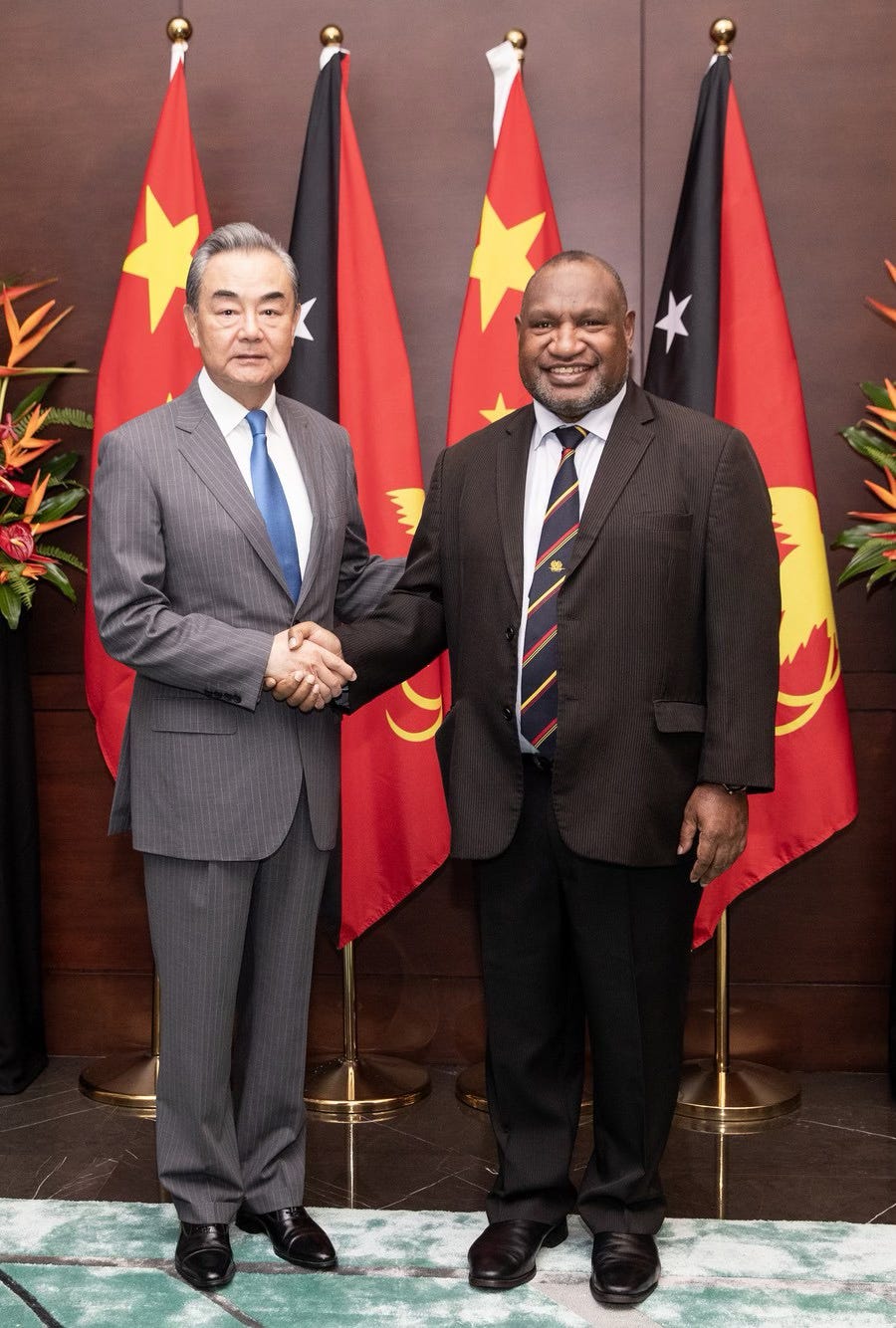
China - PNG accelerate cooperation
Global Times, Beijing
Chinese Foreign Minister Wang Yi wrapped up his visit to Papua New Guinea (PNG) with a meeting with Prime Minister James Marape, confirming mutual interests of speeding up cooperation in broad fields, which analysts said will inject more vitality into the South Pacific region.
"The mutually beneficial cooperation between the two countries has been expanding and deepening, providing a steady stream of impetus for their respective development and revitalization... and in the process of PNG's development, China will be your most reliable partner," Wang told Marape on Sunday.
Chinese observers noted that the productive discussions between the two sides highlight the warmer ties between the island country and China. They cautioned against the US's attempts to stir discord between China and PNG, emphasizing that the tangible benefits derived from partnering with China in the region cannot be overlooked by local government and the people.
The two countries have drawn up Belt and Road cooperation plans and established a working mechanism. Both sides need to implement them one by one and advance them in a timely manner to ensure that the results of the cooperation will be tangible as soon as possible and bring benefits to the PNG people, Wang said.
China is ready to maintain high-level exchanges with PNG and launch free trade agreement (FTA) negotiations as soon as possible, the Chinese foreign minister said.
For the PNG side, the Pacific island country's foreign minister said that PNG is committed to promoting the development of bilateral relations to achieve greater results.
Bilateral cooperation has yielded great results and has very solid foundations, Chen Hong, executive director at the Asia Pacific Studies Center of East China Normal University, told the Global Times on Sunday, expressing his optimism toward finalizing the FTA agreement in the future.
The signing of an FTA would be beneficial to both sides, increasing China's imports from the island country, ranging from agricultural products to iron structure and telecommunication products, and at the same time, boosting the PNG economy, Chen noted. "Though it is the largest country in the region, PNG's economy has been suffering from an unbalanced economic layout due to a long history of colonization. But in just years of cooperation with China, the actual changes in PNG is apparent."
If an FTA agreement is reached, it is expected to drive and empower the economic development of the entire region, Chinese observers noted.
Wang emphasised that China's assistance to Pacific island countries has always been free of political conditions and impositions, and China has never issued "blank checks."
However, Chinese cooperation and assistance with South Pacific island countries were hyped up by the US. Yu Lei, chief research fellow at the Research Center for Pacific Island Countries of Liaocheng University, told the Global Times that the primary reason for the unease among Western countries, led by the US, stems from the deepening and accelerated scope of cooperation between China and the regional countries, Yu noted.
For example, in the Solomon Islands election, the US and others continuously list infrastructure projects involving China's cooperation as creating a "debt trap" and "resource plundering." The US believes the significant foundational effects generated by the Belt and Road Initiative pose a serious threat to Western interests and political influence in this region.
Chen pointed that placing the Pacific family as a strategic anti-China bloc serves US' Indo-Pacific strategy. This might include using PNG as a military base to contain China.
But Chinese observers underscored that sowing discord over cooperation between China and PNG has no foundation whatsoever and cannot deceive people in the region. "Cooperation between China and South Pacific island nations has brought tangible benefits to the region, benefits that any rational government and people would not ignore," Chen noted.
The South Pacific region should not become an arena of big power rivalry, and no country should treat the island countries as its "backyard," or engage in zero-sum competition and exclusive arrangements, Wang said in a meeting with PNG Foreign Minister Justin Tkachenko.
Read more here.
Solomon Island’s election “people’s will”
By Xu Keyue and Xing Xiaojing
The Solomon Islands election is shaping up to be a tight race, and Chinese experts said that regardless of the result, the government should act in the best interests of the country and not miss out on the development opportunities, considering fruitful results have been achieved over the past several years during the island nation's cooperation with China.
Counting for several seats continued on Monday, as results showed the opposition CARE coalition drawing level with Prime Minister Manasseh Sogavare's OUR party on 12 seats in a 50-seat parliament, according to Reuters.
Independents and micro parties took 16 seats, and the major parties will seek to win independent support in negotiations this week in the race to form a government.
Ever since the election kicked off, Western media has been unceasingly hyping that the results will have a huge impact on China's influence in Solomon Islands and in the South Pacific region.
Chen Hong, director of the Australian Studies Center of East China Normal University, told the Global Times on Monday that China has always adhered to the principle of non-interference in others' internal affairs. The election process in the Solomon Islands is a response to the will of the people and has no relation to China, he added.
"Since Sogavare came to power, he has developed mutually beneficial diplomatic relations with China, leading to tangible improvements in the country's economy and livelihoods, which has made some Western countries resentful," Chen said.
Chen pointed out that the South Pacific region is a key point in the US' anti-China strategy, and the Solomon Islands is an important country in the region.
Since China and Solomon Islands established diplomatic relations in 2019, the US has never stopped exerting pressure on the island nation, such as sending Australia and New Zealand as its proxies to woo and coerce it, but with little success, said experts.
No matter who is elected, the Solomon Islands should be cautious of foreign intervention during vote counting and government forming, particularly of instigation by the US either directly or through its proxy Australia, Chen warned.
Chen stated that with all the various parties in the Solomon Islands, it cannot be ruled out that a coalition government will be formed as a result of this election, which will help maintain policy stability.
While some voices believe the potential coalition government would weaken China's influence in the South Pacific region, in reality, China has never sought to exert influence in the region, Chen stressed.
He emphasized that since establishing diplomatic relations with the Solomon Islands about five years ago, bilateral cooperation has achieved fruitful results. Although the domestic political situation in the Solomon Islands is still unclear, regardless of the outcome, the country's leaders should act in the best interests of their own country and not blindly look to reduce so-called "Chinese influence," hindering normal cooperation and missing out on development opportunities.
Read more here.




